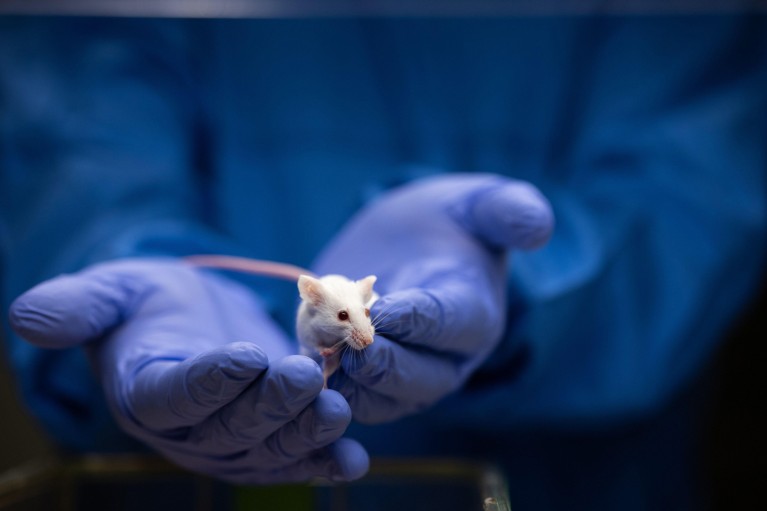
Laboratory mice live longer when they have an immune protein called IL-11 blocked, a study has found.Credit: Panther Media GmbH/Alamy
A protein that promotes inflammation could hold the key to a longer, healthier life. Blocking the protein, called IL-11, in middle-aged mice boosted metabolism, reduced frailty and increased lifespan by about 25%.
Although a research team tested for these health effects only in mice, IL-11 and its molecular partners — which include chemical messengers for the immune system called interleukins — also exist in humans. And drug candidates that block IL-11 are already in human trials against cancer and fibrosis, a condition associated with ageing in which scar tissue replaces healthy tissue.
The new results, reported on 17 July in Nature1, suggest that those potential treatments might also have an impact on longevity, but separate clinical trials are needed to be certain.
Still, IL-11’s clear path to testing in humans distinguishes it from the crowd of other proteins and rejuvenation interventions, many of which have shown promise in animal models but stalled on the way to clinical trials. “There’s a real opportunity here to translate this into clinical therapies,” says Cathy Slack, who studies the biology of ageing at the University of Warwick, UK. “And that’s where the field is kind of stuck at the moment.”
An accidental discovery
Researchers have long known that chronic inflammation contributes to diseases associated with ageing. As the body grows older and accumulates damaged proteins and other molecules, the immune system often sees these as signs of a possible infection, says Stuart Cook, a medical researcher who studies IL-11 at Duke–National University of Singapore Medical School. This can trigger inflammatory responses that might cause further damage and contribute to diseases such as cancer and autoimmune disorders.
Anti-ageing protein injection boosts monkeys’ memories
IL-11’s role in promoting inflammation has also long been clear2. But the link between the protein and ageing was discovered by accident when Cook’s colleague, molecular biologist Anissa Widjaja, also at Duke–National University of Singapore Medical School, was testing a method for detecting IL-11. She happened to include in her assay a sample of proteins taken from an old rat, and the test revealed that IL-11 levels were much higher in that sample than in those from younger rats.
The result led the team, which had not previously focused on longevity, to head in a new direction. The researchers tested a variety of samples from young and old mice and found that IL-11 was consistently more abundant in older mouse tissues, including skeletal muscle, fat and liver tissue1. When they deleted the gene that codes for the IL-11 protein in some mice, the animals had improved healthspans — they were healthy for longer — and lived 25% longer than mice with normal levels of IL-11.
Next steps
The team obtained similar results when, for 25 weeks, they used an antibody against IL-11 to block the protein in mice who were 75 weeks old — roughly the equivalent of 55 years for a person. Similar antibodies are being tested in human trials against cancer and fibrosis.
The magnitude of the response resembles that seen in some studies when mice are treated with rapamycin, a prominent drug in the anti-ageing field that is being tested for its benefits. But rapamycin has been linked to unwanted side effects, says Cook, who co-founded a Singapore-based company called Enleofen that is developing drugs against fibrosis. “Rapamycin is good for lifespan, but not healthspan,” he says.
Hacking the immune system could slow ageing — here’s how
The results are striking and should prompt further studies, says Dan Winer, who studies the role of the immune system in ageing at the Buck Institute for Research on Aging in Novato, California. One important next step would be to test candidate IL-11 drugs in mice with diverse genetic backgrounds and in multiple laboratories to be sure that the results are reproducible, he says.
Beyond that, determining the effect of anti-IL-11 drug candidates on longevity in people could be a challenge. A clinical trial examining the impacts on lifespan would be long and expensive, and the results could be difficult to interpret because many confounding factors can affect longevity.
Instead, Cook says, researchers might do well to focus on a specific condition associated with ageing, such as loss of muscle mass, that would provide quicker results and a more specific outcome.
“Ageing is a tough field,” he adds. “But there are a lot of therapeutic angles, and a lot more biology left to understand.”


